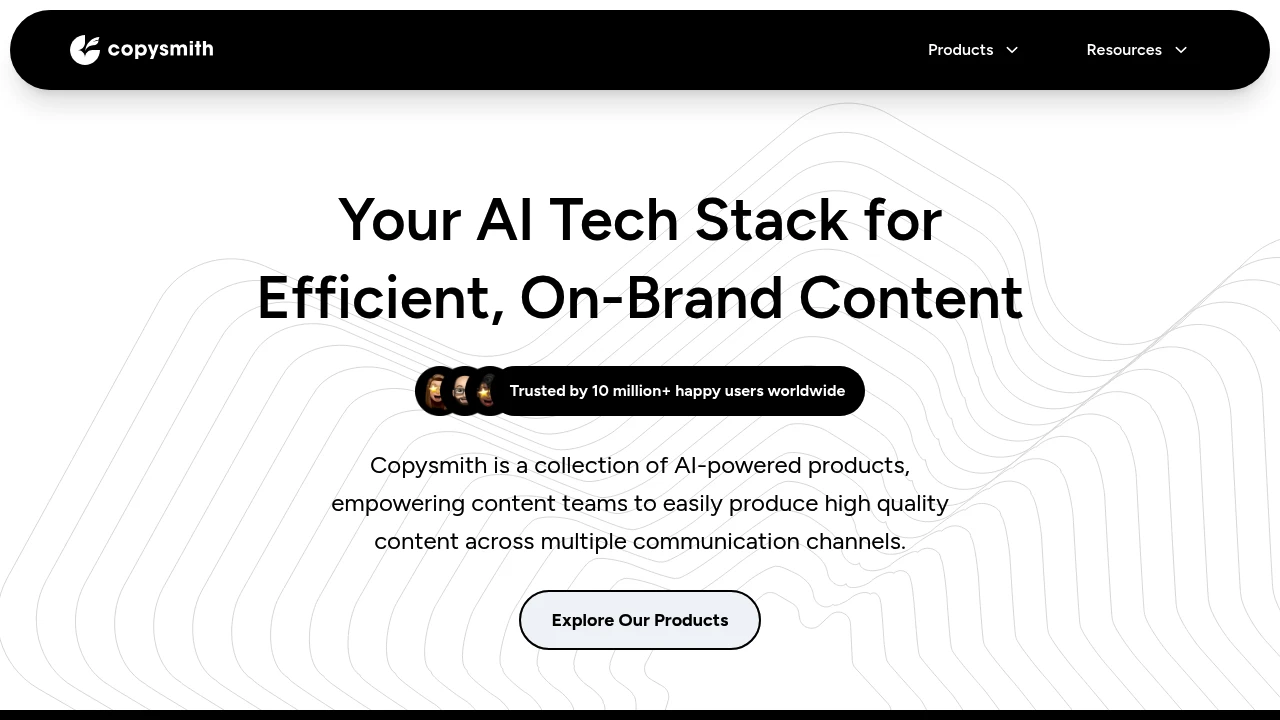CopySmith
CopySmith produces blogs and product-driven content for online stores and retail teams.

Copysmith runs as a suite. Describely turns product data into titles, descriptions, and meta at scale. Frase handles research-to-brief-to-draft for search content with live SERP signals and scoring. Rytr covers fast marketing copy with templates, tones, and a lightweight editor. You plug in your storefront, sync product records, and batch-generate clean copy; you switch to Frase for long-form pieces and refresh cycles; you lean on Rytr for ads, emails, and social. Connectors pull in Shopify or WooCommerce, Google Ads, and common work tools, so handoffs stay quick and measurable.
Core Features
- Describely (product content): Bulk generation, data enrichment, titles, meta, keywords, multilingual output, image handling.
- Frase (SEO content): SERP research, content briefs, topic/coverage scoring, GSC-powered analytics, refresh alerts.
- Rytr (marketing copy): 40+ templates, tone and length controls, quick rephrase/expand/shorten tools.
- Bulk & workflows: CSV/batch jobs, catalog sync, variant tables, approvals.
- Brand controls: Voice rules, preferred terms, banned phrasing by product.
- Connectors: Shopify, WooCommerce, Google Ads, Zapier, Hootsuite, Google Docs/Drive, Word, Chrome extension.
- Governance: Roles, share links, export to CMS and doc stacks.
Supported Platforms / Integrations
- Commerce: Shopify (app), WooCommerce.
- Ads & social: Google Ads, Hootsuite via connectors.
- Docs & CMS: Google Docs/Drive, Microsoft Word, WordPress, Chrome extension.
- Analytics: Google Search Console (via Frase).
Use Cases & Applications
- Ecommerce teams: Turn raw product data into publish-ready pages, localize at scale, and keep catalogs fresh.
- Content & SEO: Map topics, build briefs, draft against coverage targets, and plan refreshes from GSC data.
- Agencies: Standardize deliverables across stores and sites, batch work by client, and report movement clearly.
- Growth & paid: Spin ad variants, test angles, and keep copy on brand without slowing the queue.
Pricing
- Describely (product content): Pay-as-you-go from $0.75 per product; Shopify app plans at $28, $138, and $250 per month, plus high-volume custom.
- Frase (SEO): $45 Starter and $115 Professional per month; rank-ready AI docs from $2 per draft in bundles.
- Rytr (copywriter): Free plan, $9 Saver, $29 Premium per month.
- Note: Copysmith prices by product line; pick one or mix to fit volume.
Why You’d Love It
- One vendor covers product pages, search content, and daily copy.
- Bulk jobs and store connectors shorten the path from data to live pages.
- Voice, terms, and scoring keep quality high while speed stays up.
Pros & Cons
Pros
-
Suite hits three jobs: catalog, SEO, and campaigns
-
Shopify/WooCommerce focus with bulk tooling
-
Clear upgrade paths from pay-as-you-go to high volume
-
Strong integration story for ads, docs, and analytics
Cons
-
Pricing lives per product line, so budgets split across tools
-
Credits/quotas require planning on heavy months
-
Feature overlap with other stacks can add choice friction
Conclusion Copysmith gives teams an AI backbone for ecommerce and marketing. Describely scales product content, Frase turns research into search-ready articles, and Rytr covers fast copy—so the catalog grows, the blog stays current, and campaigns